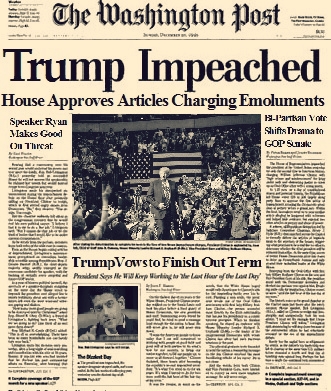“Some nations may be able to turn a blind eye to atrocities in other countries. The United States of America is different.”
—Barack Obama, Address to the Nation on Libya
Because I resent the often-superficial analyses that networks typically present after major presidential speeches, I here present a relatively lengthy review of President Obama’s outstanding speech on Libya, which couldn’t have been clearer on all of the outstanding issues, despite Republican criticisms to the contrary. I hope interested and thoughtful readers will endure this analysis.
The first bit of clarity:
In just one month, the United States has worked with our international partners to mobilize a broad coalition, secure an international mandate to protect civilians, stop an advancing army, prevent a massacre, and establish a no-fly zone with our allies and partners.
That process took a mere 31 days, said the President, compared to the more than a year it took to protect civilians in Bosnia during the 1990s. And, he said,
To brush aside America’s responsibility as a leader and—more profoundly—our responsibilities to our fellow human beings under such circumstances would have been a betrayal of who we are.
The clarity, though, in Obama’s speech was not just in what the U.S. and its international partners have accomplished or in America’s embrace of people suffering under oppression, but in how future potential interventions will be managed in matters that involve limited U.S. interests intersecting with humanitarian concerns.
It is in the expression of how Obama views these potential interventions which constitutes what I will call the Obama anti-Doctrine.
I call it anti-doctrine because typically one thinks of a doctrine as a dogmatic set of beliefs that apply in all reference frames. Obama’s willingness to project American power, however, is not so rigid that it applies in every conceivable situation, thus it can be fairly described as an anti-doctrine, which has the following three legs:
1. International cooperation
2. Limited engagement
3. Pragmatic use of American power
Obama expressed all three legs of this anti-doctrine in this one paragraph from tonight’s speech:
It’s true that America cannot use our military wherever repression occurs. And given the costs and risks of intervention, we must always measure our interests against the need for action. But that cannot be an argument for never acting on behalf of what’s right. In this particular country —Libya — at this particular moment, we were faced with the prospect of violence on a horrific scale. We had a unique ability to stop that violence: an international mandate for action, a broad coalition prepared to join us, the support of Arab countries, and a plea for help from the Libyan people themselves. We also had the ability to stop Qaddafi’s forces in their tracks without putting American troops on the ground.
1. International cooperation: “an international mandate for action, a broad coalition prepared to join us, the support of Arab countries, and a plea for help from the Libyan people themselves“
2. Limited engagement: “We also had the ability to stop Qaddafi’s forces in their tracks without putting American troops on the ground. “
3. Pragmatic use of American power: “America cannot use our military wherever repression occurs. And given the costs and risks of intervention, we must always measure our interests against the need for action.”
There you have it. As much as it may vex those who demand a one-size-fits-all foreign policy, Obama announced a set of principles that are flexible enough to both allow action in Libya and restraint in Yemen and other places. In short, a brilliant formulation of the practical rules that should govern the use of American power in gray situations that don’t directly involve our vital, black-and-white national interests, situations that materialize all too frequently these days.
Obama expressed in full his vision of the difference between our vital national interests and interests that don’t directly affect our national survival:
As Commander-in-Chief, I have no greater responsibility than keeping this country safe. And no decision weighs on me more than when to deploy our men and women in uniform. I’ve made it clear that I will never hesitate to use our military swiftly, decisively, and unilaterally when necessary to defend our people, our homeland, our allies and our core interests. That’s why we’re going after al Qaeda wherever they seek a foothold. That is why we continue to fight in Afghanistan, even as we have ended our combat mission in Iraq and removed more than 100,000 troops from that country.
There will be times, though, when our safety is not directly threatened, but our interests and our values are. Sometimes, the course of history poses challenges that threaten our common humanity and our common security — responding to natural disasters, for example; or preventing genocide and keeping the peace; ensuring regional security, and maintaining the flow of commerce. These may not be America’s problems alone, but they are important to us. They’re problems worth solving. And in these circumstances, we know that the United States, as the world’s most powerful nation, will often be called upon to help.
In such cases, we should not be afraid to act — but the burden of action should not be America’s alone. As we have in Libya, our task is instead to mobilize the international community for collective action. Because contrary to the claims of some, American leadership is not simply a matter of going it alone and bearing all of the burden ourselves. Real leadership creates the conditions and coalitions for others to step up as well; to work with allies and partners so that they bear their share of the burden and pay their share of the costs; and to see that the principles of justice and human dignity are upheld by all.
As I listened to Republican criticisms of the speech (and some Democrats’), I was struck by the fact that many of them either didn’t pay attention to it or didn’t read it or only determined to hear what they wanted to hear. Many of them wonder what the end game is; they wonder about the fate of Qaddafi. But Obama addressed that issue:
We will deny the regime arms, cut off its supplies of cash, assist the opposition, and work with other nations to hasten the day when Qaddafi leaves power. It may not happen overnight, as a badly weakened Qaddafi tries desperately to hang on to power. But it should be clear to those around Qaddafi, and to every Libyan, that history is not on Qaddafi’s side. With the time and space that we have provided for the Libyan people, they will be able to determine their own destiny, and that is how it should be.
The burden is on the Libyan people, not the American people. What could be clearer than that?
Finally, President Obama—try for just one second to imagine Michelle Bachmann or Sarah Palin or most of the other GOP putative candidates for president giving this speech—tried to set this Libyan conflict in a regional context:
Yes, this change will make the world more complicated for a time. Progress will be uneven, and change will come differently to different countries. There are places, like Egypt, where this change will inspire us and raise our hopes. And then there will be places, like Iran, where change is fiercely suppressed. The dark forces of civil conflict and sectarian war will have to be averted, and difficult political and economic concerns will have to be addressed.
The United States will not be able to dictate the pace and scope of this change. Only the people of the region can do that. But we can make a difference.
A difference, indeed.












